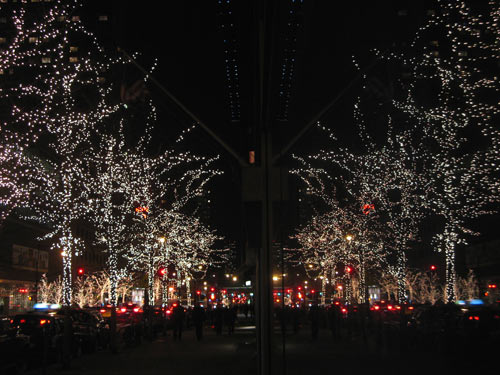Tag: Ian McEwan
Atonement on film
On my way to see Atonement tonight, I was advised by a friend who screened it a few weeks ago to “bring tissues.” Having read the Ian McEwan novel on which the film was based, I thought that good advice. I headed over to the theater — no coat required! — and settled in for a good weep.

I was prepared to love this film. Last month, Atonement garnered seven Golden Globe nominations; in addition to the nomination for best dramatic picture (among an unusually crowded field of seven), the Hollywood Foreign Press Association bestowed nods to actors James McAvoy, Keira Knightley, and Saoirse (“SEER-sha,” in case you were as flummoxed as I) Ronan, and to Joe Wright for director — none of whom, unfortunately, will get to walk the Globes’ red carpet this year, due to the writers strike.
The film is beautifully made, no question: a sprawling, epic romance set at the dawn of World War II, a tragedy sparked by a false accusation sprung from a young girl’s overactive imagination. I was pleased to see the film keep the book’s structure with its emphasis on words (written, typed, spoken), while also managing to preserve some of McEwan’s lyricism. There are so many wonderfully framed moments; Wright’s technique of replaying scenes from different characters’ perspectives works well, as does his intense focus on seemingly small visual and aural details: the incessant buzzing of a bee in the sweltering heat, the hard-driving hammers of a typewriter (echoed in Dario Marianelli’s urgent score, with solo work by French pianist Jean-Yves Thibaudet), languidly swirling smoke…
The star-cross’d lovers (dreamily played by Knightley and McAvoy) actually share rather little dialogue; Wright conveys much in their smoldering looks, and close-ups of hands: brushing secretly against each other under the dinner table, one laid gently over another during a too brief and public reunion in a busy tea room. Audible sighs and murmurs rippled through the audience during Robbie and Cecilia’s impassioned (and highly choreographed) encounter in a darkened library — probably one of the more affecting love scenes in recent memory, despite being shot almost entirely in shadow, and showing little actual skin, save for a bare, slender back.
That back, of course, belongs to Knightley and it’s sheathed in widely envied bias-cut emerald green silk dress. The stunning garment — by Atonement‘s costume designer Jacqueline Durran — recently was voted the best film costume of all time (?!) in a survey by Sky Movies and British InStyle magazine, beating the likes of Marilyn Monroe’s white dress from The Seven Year Itch and Audrey Hepburn’s black Givenchy from Breakfast At Tiffany’s, which were second and third respectively.
Technique-wise, Atonement‘s highlight is the masterful and much celebrated five-and-a-half minute tracking shot, following soldier Robbie through Dunkirk, where the British Expeditionary Force are staging their withdrawal. The camera lingers over the chaos, destruction and disorganization, swooping past looted and abandoned buildings, limbless soldiers, murdered horses, a men’s choir, and surreal images of a pommel horse and a twirling ferris wheel. This type of technical feat is always impressive; I was reminded of the last such sequence I saw, in Alfonso Cuaron’s Children of Men. According to director Wright, the one-day beach scene shoot employed an elaborate set with 1,000 extras, plus horses and vehicles, and itself made up a good portion of the film’s estimated $30 million production budget.
For all the grand scale, though, I was left feeling a bit like New York Times film critic A.O. Scott, who noted somewhat dismissively that the primary impression left by the mass evacuation scene was “Wow, that’s quite a tracking shot,” rather than “My God, what a horrible experience that must have been.”
For me, that remove carried over to the film as a whole: I found myself often impressed by what was up on screen, and at several points, quite moved, but never fully drawn in to the story. The difference between liking a movie and loving it, I suppose.
| S | M | T | W | T | F | S |
|---|---|---|---|---|---|---|
| 1 | 2 | 3 | 4 | 5 | 6 | |
| 7 | 8 | 9 | 10 | 11 | 12 | 13 |
| 14 | 15 | 16 | 17 | 18 | 19 | 20 |
| 21 | 22 | 23 | 24 | 25 | 26 | 27 |
| 28 | 29 | 30 | ||||
Search
Popular Tags
Categories
Archive
- July 2010
- July 2009
- January 2009
- November 2008
- September 2008
- August 2008
- July 2008
- June 2008
- May 2008
- April 2008
- March 2008
- February 2008
- January 2008
- December 2007
- November 2007
- October 2007
- September 2007
- August 2007
- July 2007
- June 2007
- May 2007
- April 2007
- March 2007
- February 2007
- January 2007
- December 2006
- November 2006
- October 2006
- September 2006
- August 2006
- July 2006
- June 2006